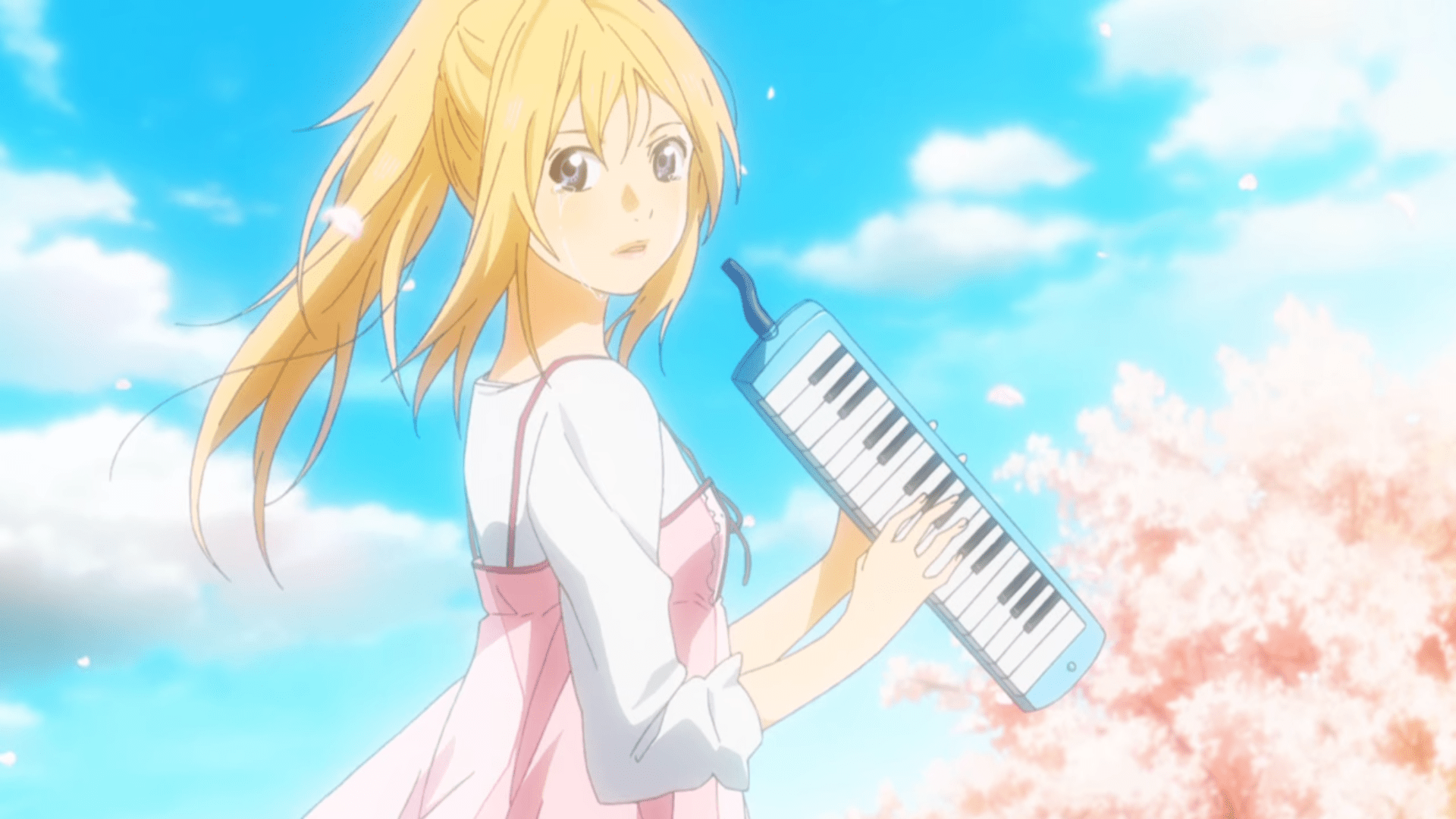SYNOPSIS
Your Lie in April follows the life of Arima, Kousei, a young piano prodigy who lost his passion for the piano after the death of his mother. Enter Kaori, the strong-willed violinist who is determined to get Kousei back on the piano.
MY THOUGHTS
Okay, so I had high hopes for Your Lie In April, not because of the high community praise but because a friend of mine (who I suspected had a similar taste in anime) found the ending to be particularly beautiful and tasteful. And while I wasn’t expecting anything groundbreaking from a story about a pianist rediscovering his passion for music, it still sounded like something I would enjoy as I am a creative who has frequently hit struggles with my craft. In other words, while I wasn’t expecting to perfectly align with any of the characters, I expected to see at least a few parallels. Plus because it’s a serious anime with a lovely art style, I expected that there would be elements of romance or romanticism thrown in.
Here was my final takeaway:
“I don’t mind being treated terribly as long as the woman mistreating me is hot.”
And make no mistake. The main character literally says as much.
“I’m a moron. She’s ultra-violent. Her personality blows. She leaves the worst impression. But… she’s beautiful.”
Arima, Kousei (Episode 21)
Okay, except this leaves very little in terms of substance. Let’s start from the beginning.
THE STORY (5/10):
So, the premise of the story isn’t actually one of nightmares. The idea is that Kousei is processing the loss of his abusive mother who also happened to be his piano instructor. This translates into his perception of music and colour. The lack of colour or music became associated with struggle or dulled feeling and the burst of colour or music became associated with passion and happiness. It’s corny, but beautiful and if that were all there was to the story, I’d probably have a lot more positive to say about it.
Unfortunately, no.
I’ll start again with the mention of Kousei processing the loss of his abusive mother. The portrayals of the abuse Kousei endured are vivid with him being beaten, yelled at, denied social time, denied sleep, etc. It’s all very ugly and you’d think that it would amount to more than it did. Instead, we’re treated to supposed lifelong friends literally beating on Kousei (kicking him, punching him, throwing things at him, crying to manipulate him) being played for comedy, then the immediate juxtaposition with the abuse he received from his mother. It felt reductive and tone-deaf. Violent slapstick as comedy does not work when you’re trying to make a point about violence being mentally and physically harmful.
With our setup now underway, Kousei meets the beautiful and talented violinist, Kaori, who tries to shoehorn him back into the music world by force. She never makes any effort to learn about Kousei, much less his trauma. She barely even looks at him. (In one of the episodes toward the end, Kousei even comments that most of his memories of her are of him viewing her from behind, which really tells me all I need to know about her character.) She ends up taking advantage of him and seeing his labour, his intelligence, and even his LIFE as expendable to her own ends. With this in mind, I don’t understand how anyone can romanticize this series.
That isn’t to say that it didn’t have a chance to be a fulfilling piece. What would have been required would’ve been sincere character development on behalf of Kaori where she comes to appreciate and work with Kousei to understand his needs and help him break through the mental blockade put up by his mother. If not, then Kousei realizing that he deserves better and putting his foot down. It doesn’t need to be a hostile moment, but it needs to be a moment where it’s very clear that he values her in every conceivable way, but doesn’t appreciate her abuse and will no longer continue to hang around as long as it happens with dedicated follow-through. Any time she tries to abuse him after that, he would simply walk away. This type of resolve would have added far more to the story.
Instead, Kousei is told to see the results of his abuse as a blessing. Yes, really. And he ends up kowtowing to his mother and Kaori both in this way. This approach has the added bonus of making it never really feel like Kousei reclaimed his love of music. He’s playing because he has to and has nothing else. Yuck. An entire series built on romanticizing victim-blaming.
THE CHARACTERS (3/10):
Arima, Kousei:
Here’s the thing. I liked Kousei. He’s probably the most well-developed and sincere of all of the characters in the show. Pretty much any character details I found likable were all attributable to him.
For one thing, he’s a child who is regarded as a prodigy with intelligence and maturity reaching well beyond his years. Some may find his monologues unrealistic because they sound far more refined than what a child might normally come up with, but I feel like that’s kind of the point. He’s already faced a lot of tragedy in his young life and everyone is holding him to a ridiculously high standard, so he likely compensates without realizing he’s doing it.
As a character, he is generally passive and yields to the stronger wills of other characters, which is consistent with a character who’s been beaten into compliance. I will note that it’s not inherently a bad trait to accommodate and follow others. Humans are a social species, etc, etc. Unfortunately, this willingness to constantly yield leaves him vulnerable to ongoing abuse that the series never addresses in a meaningful way. Adults, who should be recognizing his patterns and actually helping him, end up enabling his continued abuse and internalizing of previous abuse. This leads to the whole tone of the series reading as one big, long “suck it up, buttercup” and “if you just beat the depression out, it’ll be fine.” And ultimately, his development – despite being the most of any character in the show – still ends up being hollow and not really belonging to him. Every one of Kousei’s “victories” is a victory for one of his abusers. That’s it.
Imagine writing a character and their only development is “I’m going to do what my abuser wanted me to do and I’m going to thank my abuser for giving me the knowledge/opportunity. I will also ask for my abuser’s forgiveness while I’m at it.”
This line of development reads more like a tragedy than one capable of a happy ending. It would have been different if he dedicated himself to reclaiming his past, choosing to love music in his own way, moving on without his mother in the picture, etc. but that’s not what happened. Oh, well.
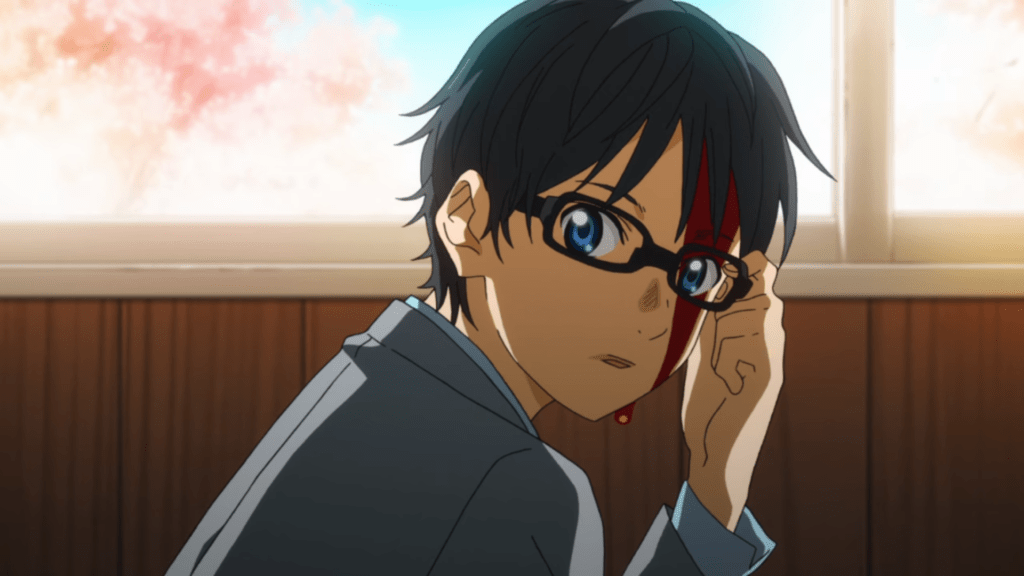
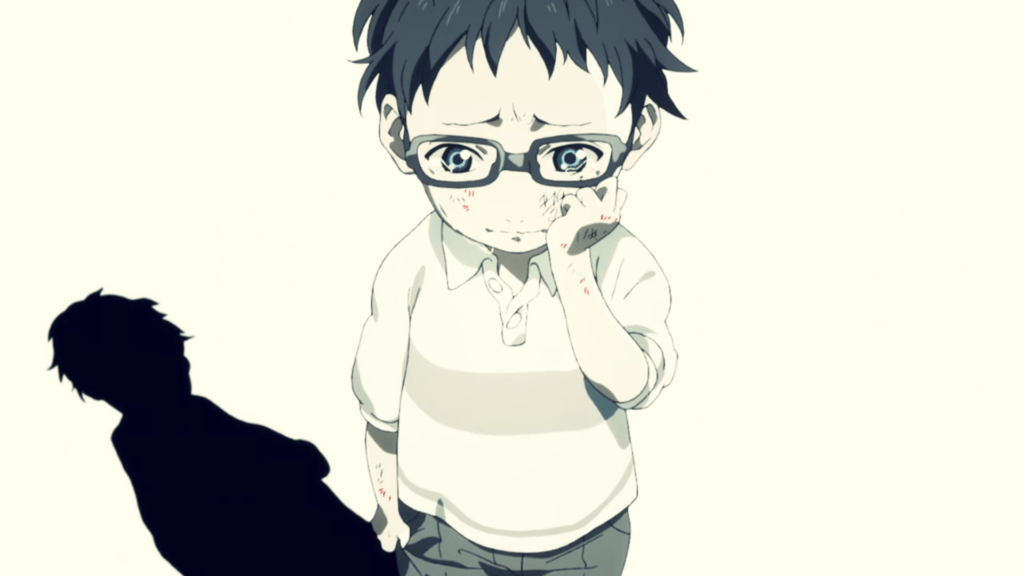
Miyazono, Kaori:
As you’re probably already aware, Kaori is beautiful and a highly skilled violinist. No one is taking that away from her. But here’s the thing: you can be beautiful, highly skilled, and also a horrible person.
You could almost feel the writers scrambling to give her an ounce of something sympathetic by making her physically frail, but here’s another thing: being frail still doesn’t give you a license to be a horrible person.
What makes her so horrible?
For one thing, she has zero interest in actually being friends with the friends she’s portrayed as hanging around in the series. They are strictly a means to an end. There’s zero sincerity on her part.
She doesn’t care for Kousei either. She constantly uses him, screams at him with no provocation, throws things at him, forces him to do things against his will, etc. But while the show tries hard to frame it as her doing things for Kousei’s betterment, she’s really doing it because she stands to gain from him. Every. Single. Time.
Her goal is ultimately an exercise in carving out some type of immortality for herself, which is not inherently some great evil, but instead of working to understand Kousei and create something they can both be proud of in this world and the next, she forces Kousei to yield to her demands.
Toward the end of the series, she even reveals that everything she knows about Kousei is superficial. Well, whose fault is that exactly?! It’s not like Kousei is a closed book. In fact, she spends the entire series feeling entitled to Kousei and at the end of the series, she fires a parting shot that could only be motivated by wanting to cement her semblance of immortality with no accountability for the drama it would cause and the people it would hurt, but at least she won’t be forgotten. I guess remembering someone for being horrible is something?
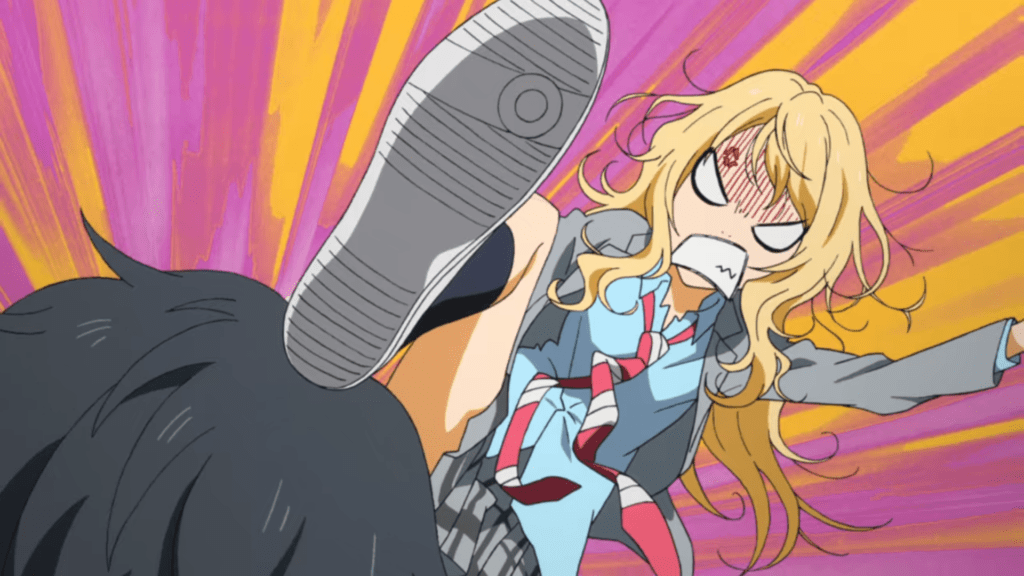
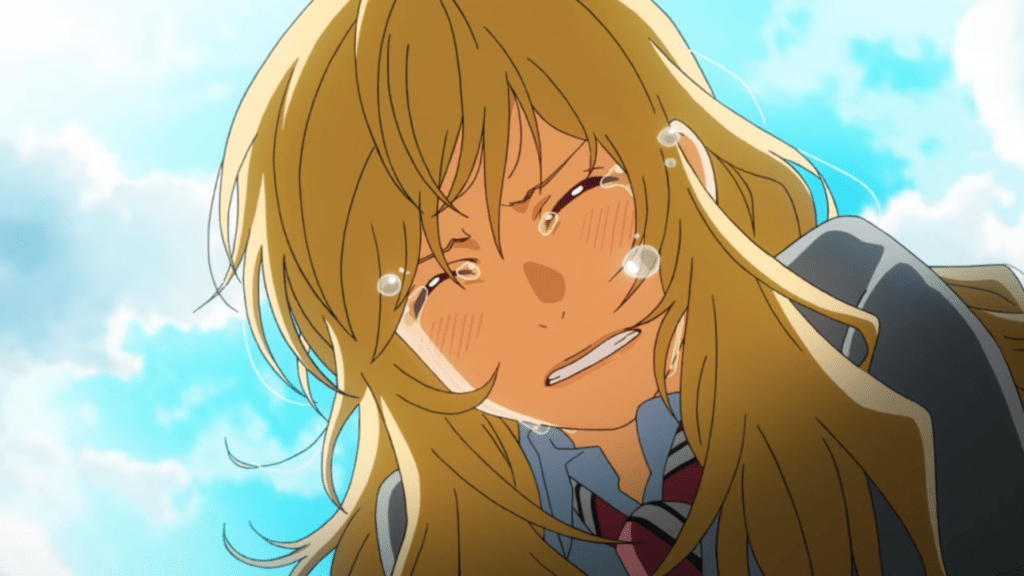
Sawabe, Tsubaki:
Tsubaki is Kousei’s childhood friend. They are portrayed as having a long history and growing up together. Supposedly, no one understands Kousei better than Tsubaki and this is true to a detrimental degree. By this, I mean that perhaps some actions could have been overlooked or even forgiven if coming from someone who didn’t know Kousei well.
The reality is when looking at what she does, it comes off as a deliberate effort to cause protracted suffering. At first, it’s mainly to do with kicking/hitting/throwing things at Kousei (which doesn’t come off as endearing when shown against his background of childhood abuse trauma), but then she spends too much time egging on Kaori.
At no point does she try to protect Kousei despite seeing him as her “helpless kid brother” and ends up looking more like Kousei’s bully. Things get worse as the series progresses and I’ll spare you the suspense: she’s selfish. She feels entitled to Kousei. She’s basically Kaori with added history and no music.
Watching the progression of both Kaori and Tsubaki made me want to ask the writers who hurt them, because geez. Both girl characters with the most attention ended up being horrible people.
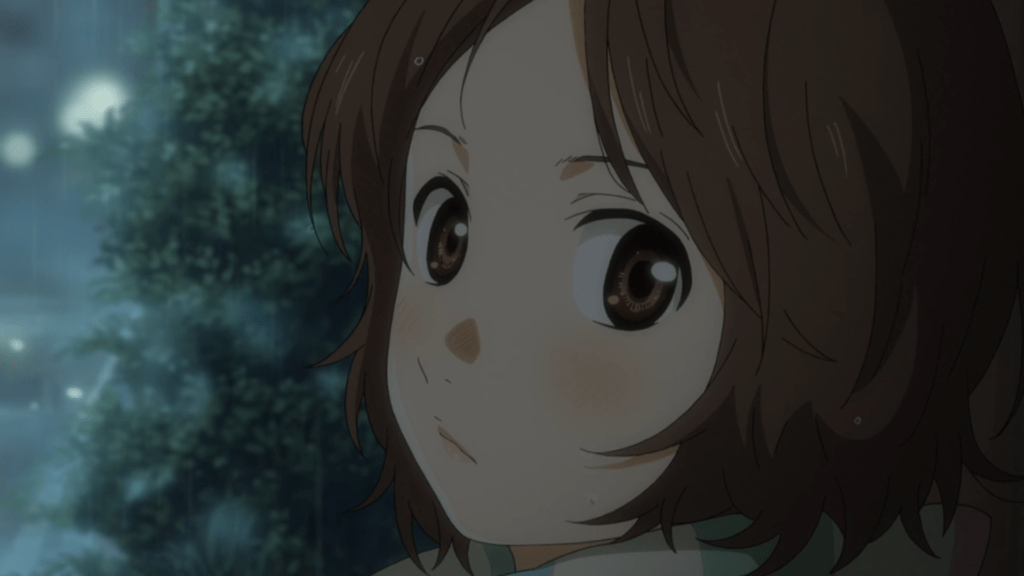
Watari, Ryouta:
I don’t actually have much bad to say about Watari and you might think that’s a good thing. Well, brace yourself because… I have nothing bad to say because Watari doesn’t really have a character. He’s just a womanizer who attempts to support Kousei at different parts of the story. He appears either blissfully unaware of Kaori’s and Tsubaki’s abusive natures or if he knows, then he doesn’t try to intervene. He just kind of lets things go wherever and that’s fine, but it doesn’t make him memorable at all. The only mildly memorable thing about him is that he looks like a better character from a different anime.
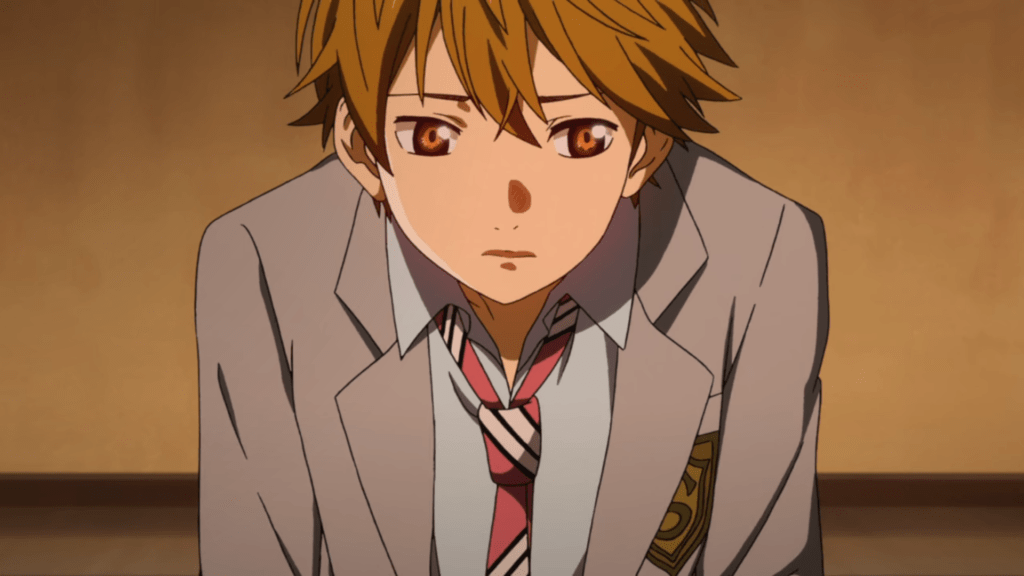
Seto, Hiroko:
She is shown to have a significant role in Kousei’s life. She knew about his mother, his abuse, and his breakdown. Unfortunately, this doesn’t really amount to anything. She is one of the adults in Kousei’s life and the most prominent in the anime, and she is the biggest pusher for the acceptance of his abuse. That she is shown with a child with her honestly makes me worry for the child. Good job, writers. You had one adult and she did exactly nothing to actually help Kousei. The anime will try to paint it differently, wrapping it in a pink motif with a sparkly bow, but no. Internalizing abuse may work temporarily, but Kousei is most likely going to need tons of therapy once he’s an adult. Frankly, I just want to know how Kousei is going to be able to resolve her having been a bystander in his abuse. What’s that? They don’t deal with that at all? Ahhhh!
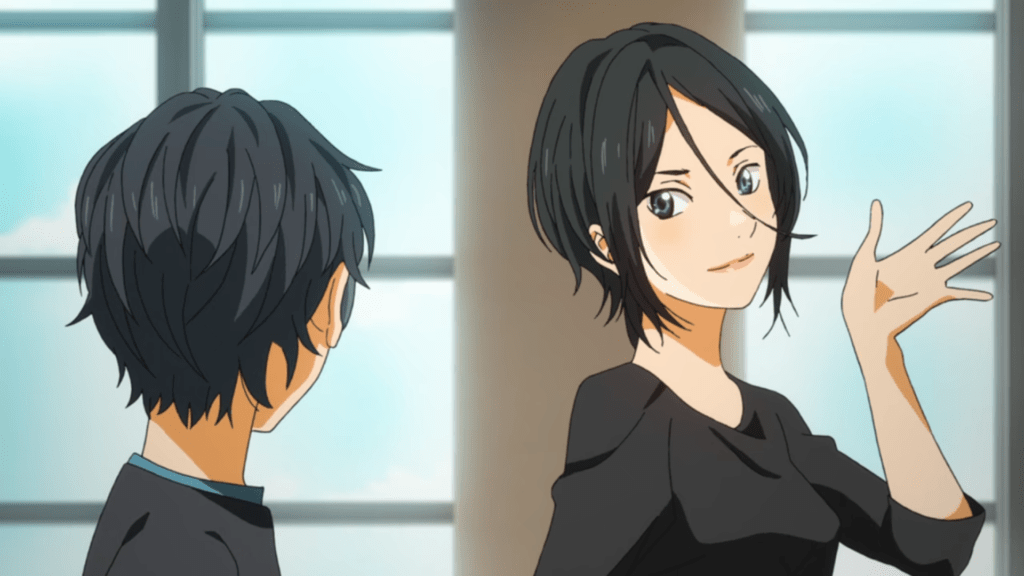
The best I can say about the rest of the characters (Takeshi, Emi, Nagi, etc.) is that they’re the only ones who don’t actually end up hurting Kousei in any way. What a concept.
THE ART (3/10):
While the style we are familiar with is no doubt beautiful, the animation is… atrocious. The usual chibifying of the characters while they yell at each other, etc. was hideous to look at when put right next to the style the show was actually going for. Even when in their regular mode, characters were frequently off-model. And while I could complain about the panning shots, I won’t because I get it: animation is expensive and I don’t get to say anything when I was able to enjoy Tsubasa, which was a far worse offender. However, with inconsistent appearances, points needed to be docked from the overall art score.
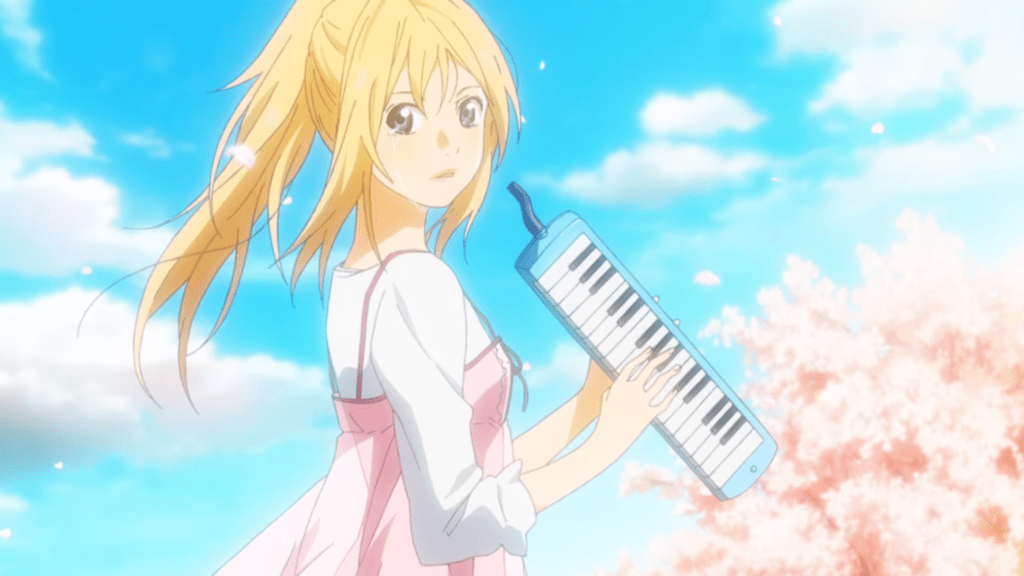
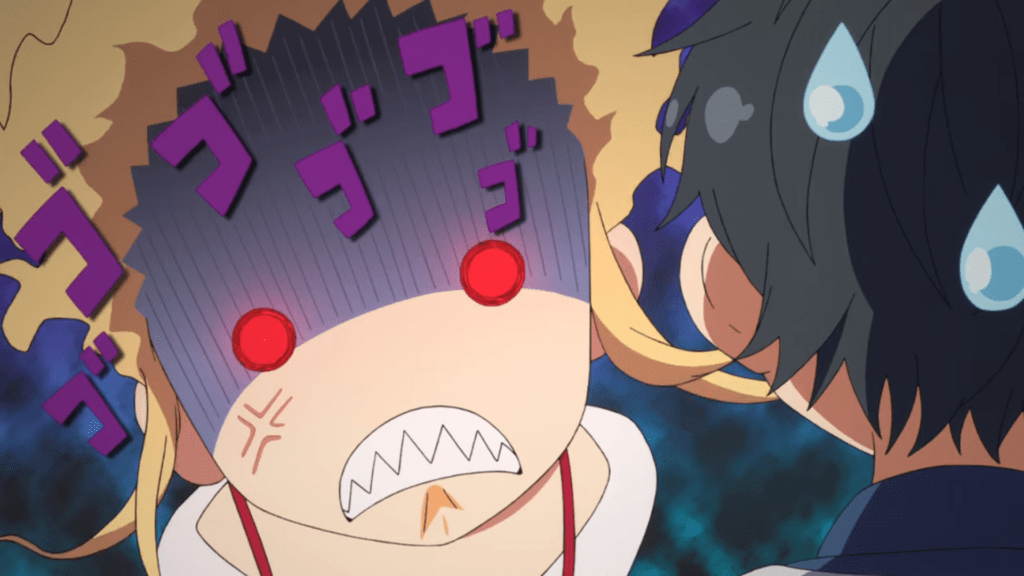
THE SOUND (9/10):
I suppose the sound was supposed to make up for the atrocious animation. With a music score comprised mostly of classical music, the episodes were a treat to listen to. The voice acting was also solid enough.
OVERALL (4/10):
I gave it a generous score because the music alone was enough to bring it up, but if you want nice music, you can listen to it without the series attached.
And in case you’re wondering if this is the series that will get your tears flowing, it’s unlikely unless pictures/animations of people crying are enough to send your empathy metre through the roof, but if that’s the case, there are better options out there.
Unfortunately, Your Lie In April is just bad.
It might not be the worst anime I’ve ever seen, but I wouldn’t recommend it to anyone, even if they’re already fancying watching it.
Are you still considering watching it anyway? Check out my non-spoiler warnings post to avoid unpleasant surprises.
